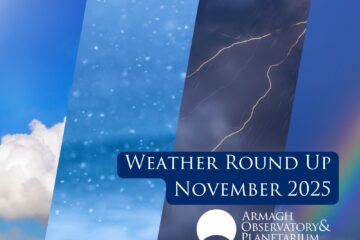FEBRUARY 2021 WARMER AND WETTER THAN AVERAGE WITH ABOUT AVERAGE SUNSHINE. WINTER 2020/2021 COOLER AND WETTER THAN AVERAGE WITH AVERAGE SUNSHINE
Armagh Observatory reports that February 2021 was warmer and wetter than average with about average sunshine. The meteorological winter (December 2020, January 2021 and February 2021) was cooler and wetter than average with roughly average sunshine.
Total February precipitation was 74.2 mm (2.92 inches) including 6 trace values, that is, 73.9 mm if trace values are ignored. The 183-year long-term (1838–2020) average February precipitation is 55.49 mm and the most recent (1991–2020) 30-year average is 59.02 mm, so February 2021 was approximately 34% wetter than the long-term average and 26% more than the most recent 30-year average. This continues a recent trend at Armagh for slightly higher February precipitation than the long-term February average.
There were no exceptionally wet days, the wettest and second-wettest being the 2nd and 18th with 9.6 mm and 9.3 mm respectively. Snow pellets were recorded as falling on the 7th, with snow on three other days. Gale-force winds were recorded on the 13th, with strong winds gusting up to near gale on the 14th. A rainbow was noted on the afternoon of the 21st.
The mean monthly temperature was 6.04 degrees Celsius (42.9 F), which means that February 2021 was very mild despite a cold start to the month, approximately 1.4 C warmer than the 225-year long-term (1796–2020) February average at Armagh (4.65 C) and 0.71C warmer than the most recent (1991–2020) 30-year average (5.33 C). This continues a recent trend towards warmer average February temperatures at Armagh, for example the 1981–2010 30-year average was 4.92 C.
The two warmest days (highest maximum air temperature) were 13.4 C on the 23rd and 13.3 C on the 14th. The coldest day (lowest maximum air temperature) was 2.8 C on the 7th, followed by 3.2 C on the 11th. The two lowest minimum air temperatures were -3.3 C and -2.6 C on the 10th and 11th respectively. The highest minimum air temperature was 9.8 C on the 24th, followed by 8.1 C on the 16th.
There were 16 nights with ground frost (minimum grass temperature less than or equal to zero), the lowest two of which occurred on the 10th and 11th, with minimum grass temperatures of -10.6 C and -9.4 C respectively. There were five nights with night-time air frost, that is, with minimum air temperatures less than or equal to zero.
With 69.2 hours of strong sunshine, February 2021 was sunnier than the 140-year (1881–2020) long-term average February sunshine at Armagh 65.4 hours), but slightly duller than the most recent (1991–2020) 30-year average (70.9 hours). The two sunniest days were the 25th and 22nd, with respectively 8.2 and 7.4 hours of strong sunshine.
Taking the meteorological winter 2020/2021 as a whole, that is, the months December 2020, January 2021 and February 2021, this year’s winter at Armagh was cooler and wetter than average and with about average sunshine.
The mean winter temperature was 4.61 C (40.3 F), which is approximately 0.13 C warmer than the 225-year long-term (1796/1797–2020/2021) average winter temperature at Armagh (4.48 C), and 0.6 C cooler than the most recent (1991/1992–2020/2021) 30-year average (5.21 C). This was the coolest winter at Armagh for three years, that is since an average temperature of 4.5 C was recorded for winter 2017/2018. Total winter precipitation was 255.65 mm (10.06 inches) including 21 trace values, that is, 254.6 mm if trace values are ignored. This is approximately 24% more than the 183-year
long-term (1838/39–2020/21) average winter precipitation at Armagh (207.0 mm) and nearly 19% more than the most recent (1991/92–2020/21) 30-year average (215.7 mm). This continues a recent trend towards slightly wetter winters at Armagh compared to the long-term average.
There was a total of 162.8 hours of strong sunshine recorded at Armagh during winter 2020/2021. This is nearly 9% more than the 140-year (1881/82–2020/21 average winter sunshine at Armagh (149.7 hours) but only approximately 1% more than the most recent (1991/92–2020/21) 30-year average winter sunshine at Armagh (161.5 hours).
These data refer to observations at Armagh Observatory, which has been recording the weather at Armagh since 1795.
FOR FURTHER INFORMATION PLEASE CONTACT: Mark Bailey at the Armagh Observatory, College Hill, Armagh, BT61 9DG. Tel.: 028-3752-2928; FAX: 028-3752-7174; mark.bailey@armagh.ac.uk; URL: http://climate.armagh.ac.uk/.



0 Comments